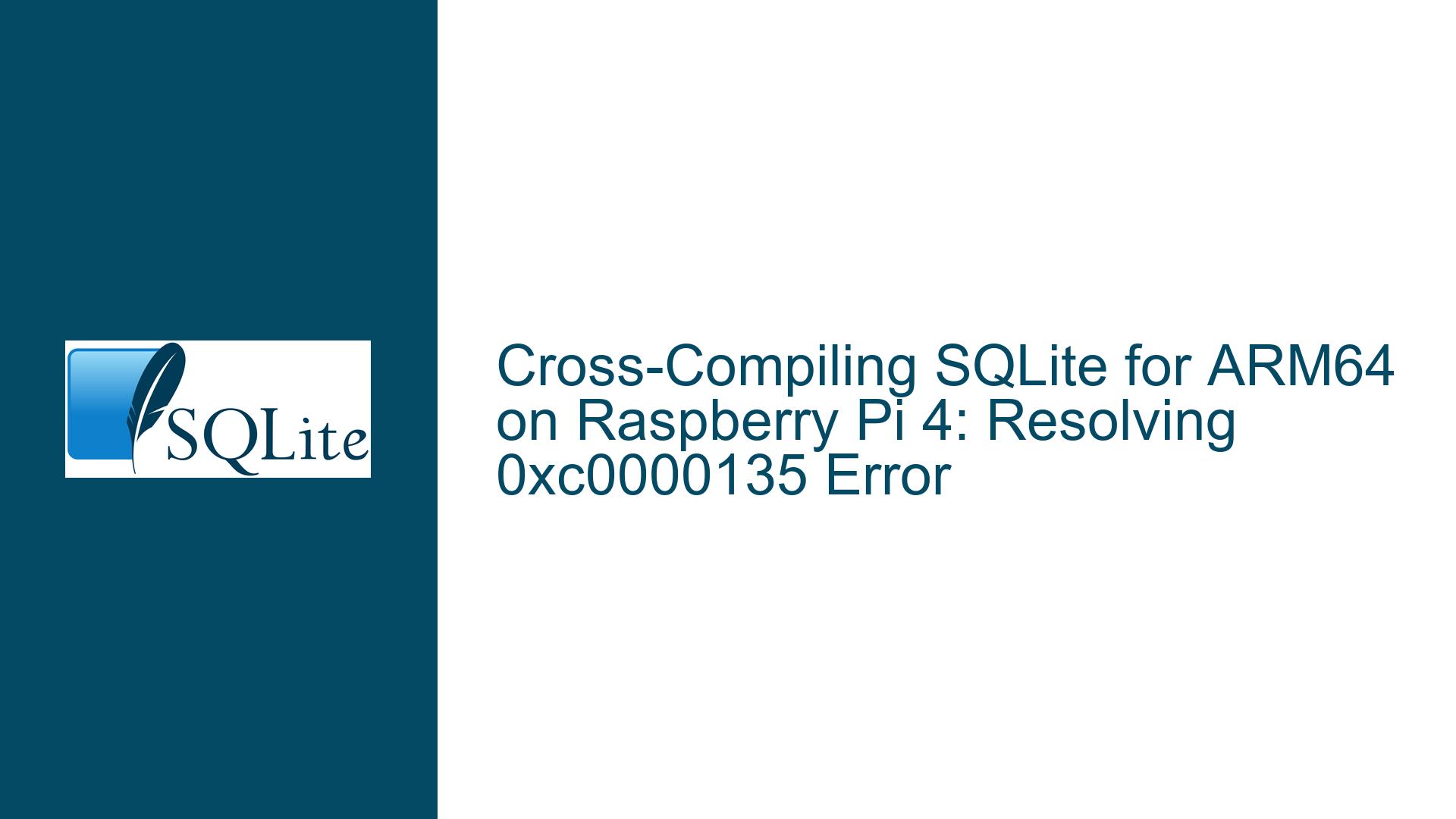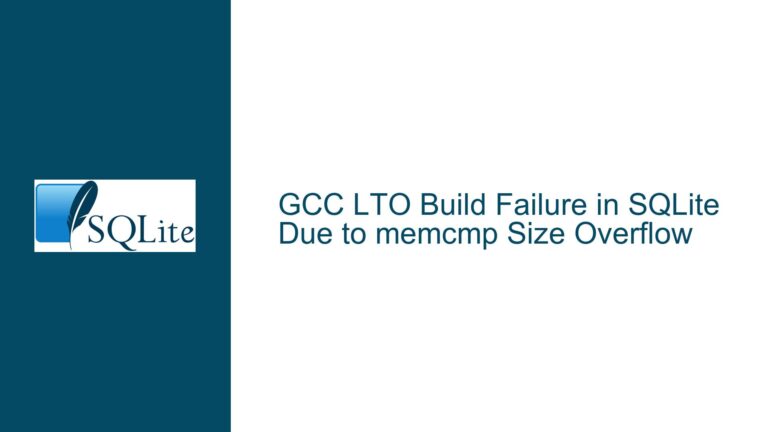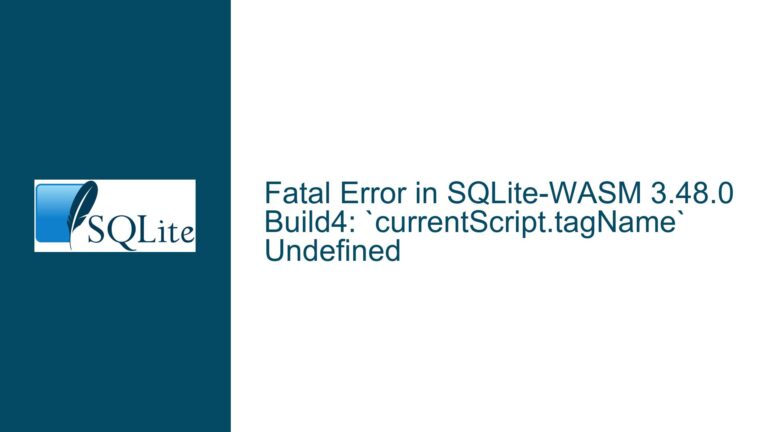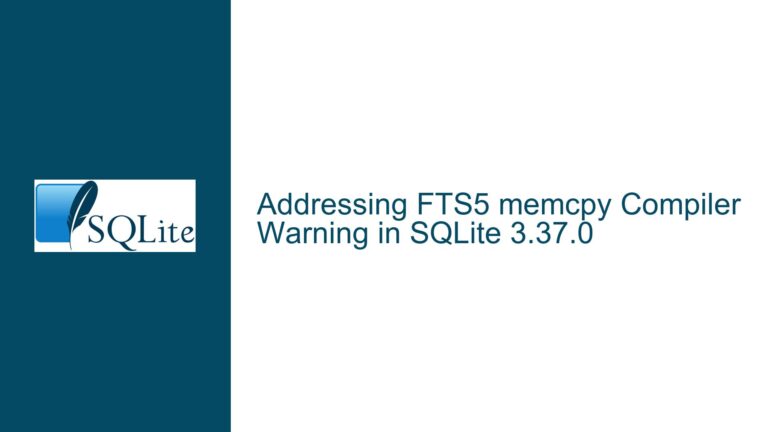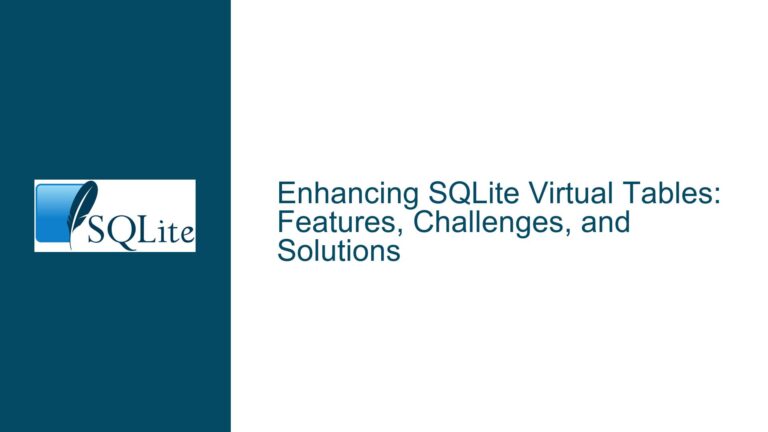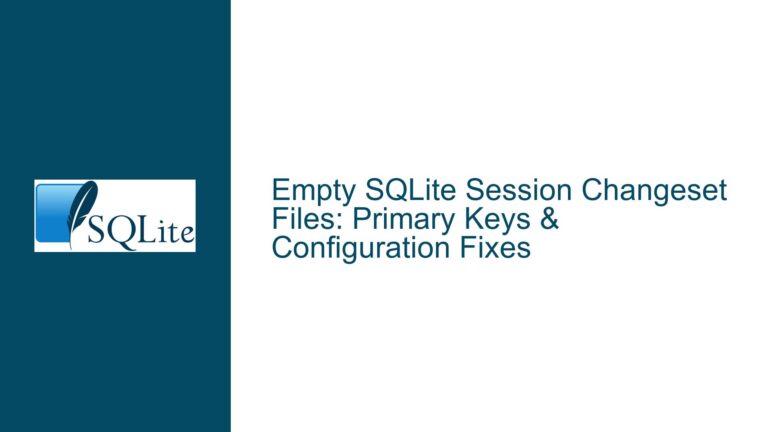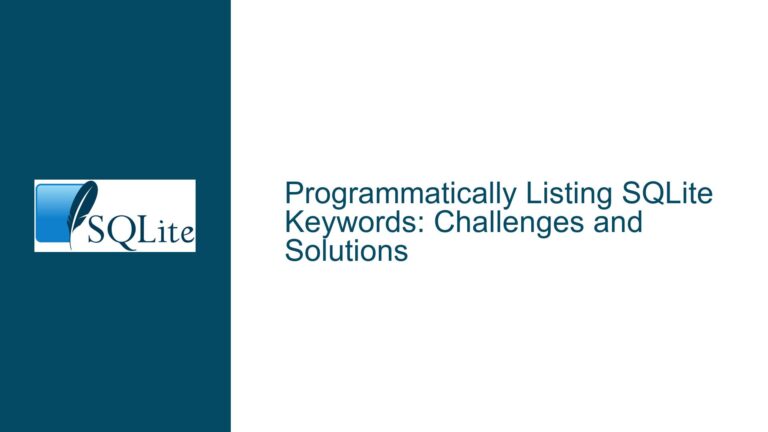Cross-Compiling SQLite for ARM64 on Raspberry Pi 4: Resolving 0xc0000135 Error
Issue Overview: Cross-Compilation of SQLite Components for ARM64 on Raspberry Pi 4 Results in 0xc0000135 Error
The core issue revolves around attempting to execute a C# test application on a Raspberry Pi 4 (ARM64 architecture) that depends on cross-compiled SQLite.Interop.dll and System.Data.SQLite.dll libraries. The application fails to launch with error code 0xc0000135, which corresponds to STATUS_DLL_NOT_FOUND in Windows environments. However, the Raspberry Pi 4 typically runs a Linux-based OS, introducing ambiguity in the target platform and execution context. This error suggests a fundamental incompatibility between the compiled binaries, the host OS, and the runtime environment. The problem is exacerbated by the fact that the same compilation workflow succeeds for x86 and x64 architectures but fails for ARM64, indicating a misconfiguration specific to cross-compilation toolchains, dependency resolution, or binary format mismatches.
The 0xc0000135 error is a critical system-level exception that occurs when the operating system cannot locate a required dependency or when the dependency is incompatible with the host environment. In this scenario, the error manifests during the execution of the C# test application, implying that either the SQLite.Interop.dll or System.Data.SQLite.dll libraries are missing, improperly linked, or compiled for an incorrect architecture or OS. The use of Microsoft Visual C++ (MSVC) 2022 for cross-compilation raises questions about toolchain compatibility, as MSVC primarily targets Windows platforms, whereas the Raspberry Pi 4 operates on Linux (e.g., Raspberry Pi OS). This discrepancy between the compilation environment (Windows/MSVC) and the deployment environment (Linux/ARM64) introduces multiple layers of potential failure, including binary format mismatches (ELF vs. PE), ABI incompatibilities, and missing runtime dependencies.
Possible Causes: Mismatched Architecture Targets, Incomplete or Incorrect Build Environment Configuration, Dependency or Interoperability Conflicts in Cross-Compiled Binaries
Mismatched Architecture Targets
The Raspberry Pi 4 uses an ARM64 CPU, which employs the AArch64 instruction set and follows the ARM Application Binary Interface (ABI). Cross-compiling for ARM64 from an x86_64 or x86 host requires explicit configuration of the toolchain to target aarch64-linux-gnu or similar triplets. If the compilation process defaults to the host architecture (x86/x64) or specifies an incorrect target (e.g., armv7l instead of aarch64), the resulting binaries will be incompatible with the Raspberry Pi 4. Additionally, the distinction between hard-float (armhf) and soft-float (armel) ABIs can cause runtime failures if not aligned with the OS’s expectations.
Incomplete or Incorrect Build Environment Configuration
MSVC 2022 is designed for Windows development and lacks native support for Linux/ARM64 targets. While it is possible to configure MSVC for cross-compilation using platforms like MinGW or WSL, this setup is non-trivial and prone to errors. Key issues include:
- Toolchain Selection: Using MSVC instead of GCC or Clang for Linux targets leads to PE-format binaries (DLLs) instead of ELF-format shared objects (.so), which are incompatible with Linux.
- Header and Library Paths: Incorrect inclusion of Windows-specific headers or libraries during compilation.
- Runtime Dependencies: Omission of ARM64-specific runtime libraries (e.g., glibc, libstdc++) required by the SQLite.Interop.dll.
Dependency or Interoperability Conflicts in Cross-Compiled Binaries
The System.Data.SQLite.dll acts as a managed wrapper around the native SQLite.Interop.dll. If these components are compiled for different architectures or linked against incompatible runtime versions, the .NET runtime on the Raspberry Pi will fail to load them. Common pitfalls include:
- Mixed Architecture Binaries: One DLL targets ARM64 while the other targets x86/x64.
- Symbol Conflicts: Missing or mismatched symbols between the managed and native layers due to version mismatches.
- File Naming Conventions: Linux expects native libraries to follow the lib.so* naming convention, whereas the project uses .dll extensions, leading to resolution failures.
Troubleshooting Steps and Solutions: Validating Target Architecture Compatibility, Reconfiguring Cross-Compilation Toolchain and Build Settings, Resolving Dependency and Interoperability Issues
Validating Target Architecture Compatibility
Verify Binary Formats on the Raspberry Pi
Use thefilecommand to inspect the architecture and OS compatibility of the compiled binaries:file SQLite.Interop.dll file system.data.sqlite.dll file test.arm.2017.exeValid output for ARM64/Linux binaries should include ELF 64-bit LSB shared object, ARM aarch64. If the output references PE32+ or x86_64, the binaries are incorrectly compiled for Windows or x64.
Compare with Known Working Binaries
Executefileon a native ARM64 binary on the Raspberry Pi (e.g.,/bin/ls) to establish a baseline:file /bin/lsEnsure the compiled DLLs match the architecture and OS shown here.
Reconfiguring Cross-Compilation Toolchain and Build Settings
Switch to a Linux-Compatible Toolchain
Abandon MSVC in favor of a GCC-based cross-compiler targeting ARM64 Linux:- Install the aarch64-linux-gnu-gcc toolchain on the Windows host using WSL, Cygwin, or a Linux VM.
- Recompile SQLite.Interop.dll using:
aarch64-linux-gnu-gcc -shared -o libSQLite.Interop.so [SQLite_Source_Files] -fPIC - Modify the C# project to reference the .so file instead of .dll.
Adjust Build Scripts for ARM64 Targets
Explicitly specify the target triplet and ABI in build configurations:./configure --host=aarch64-linux-gnu --target=aarch64-linux-gnu makeRebuild System.Data.SQLite with Correct Interop
Use mkbundle or dotnet publish to ensure the managed wrapper links against the correct native library:dotnet publish -r linux-arm64
Resolving Dependency and Interoperability Issues
Install Missing Runtime Libraries on the Raspberry Pi
Use the package manager to install ARM64 versions of dependencies:sudo apt-get update sudo apt-get install libc6-dev:arm64 libsqlite3-dev:arm64Set Proper Library Search Paths
UseLD_LIBRARY_PATHto direct the runtime to the location of libSQLite.Interop.so:export LD_LIBRARY_PATH=/path/to/libraries:$LD_LIBRARY_PATH ./test.arm.2017.exeReconcile File Naming and Extensions
Rename SQLite.Interop.dll to libSQLite.Interop.so and update the C# P/Invoke declarations:[DllImport("libSQLite.Interop.so")]Debug with strace and ldd
Usestraceto trace system calls during application launch and identify missing files:strace ./test.arm.2017.exeUse
lddto check unresolved dependencies in the shared libraries:ldd libSQLite.Interop.so
By systematically addressing architecture mismatches, retooling the build environment for Linux/ARM64, and ensuring consistent naming and dependency resolution, the 0xc0000135 error can be resolved, enabling successful execution of the SQLite-dependent application on the Raspberry Pi 4.
